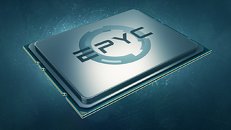Wednesday, January 3rd 2018

AMD Struggles to Be Excluded from Unwarranted Intel VT Flaw Kernel Patches
Intel is secretly firefighting a major hardware security vulnerability affecting its entire x86 processor lineup. The hardware-level vulnerability allows unauthorized memory access between two virtual machines (VMs) running on a physical machine, due to Intel's flawed implementation of its hardware-level virtualization instruction sets. OS kernel-level software patches to mitigate this vulnerability, come at huge performance costs that strike at the very economics of choosing Intel processors in large-scale datacenters and cloud-computing providers, over processors from AMD. Ryzen, Opteron, and EPYC processors are inherently immune to this vulnerability, yet the kernel patches seem to impact performance of both AMD and Intel processors.
Close inspection of kernel patches reveal code that forces machines running all x86 processors, Intel or AMD, to be patched, regardless of the fact that AMD processors are immune. Older commits to the Linux kernel git, which should feature the line "if (c->x86_vendor != X86_VENDOR_AMD)" (condition that the processor should be flagged "X86_BUG_CPU_INSECURE" only if it's not an AMD processor), have been replaced with the line "/* Assume for now that ALL x86 CPUs are insecure */" with no further accepted commits in the past 10 days. This shows that AMD's requests are being turned down by Kernel developers. Their intentions are questionable in the wake of proof that AMD processors are immune, given that patched software inflicts performance penalties on both Intel and AMD processors creating a crony "level playing field," even if the latter doesn't warrant a patch. Ideally, AMD should push to be excluded from this patch, and offer to demonstrate the invulnerability of its processors to Intel's mess.
Source:
Phoronix Forums
Close inspection of kernel patches reveal code that forces machines running all x86 processors, Intel or AMD, to be patched, regardless of the fact that AMD processors are immune. Older commits to the Linux kernel git, which should feature the line "if (c->x86_vendor != X86_VENDOR_AMD)" (condition that the processor should be flagged "X86_BUG_CPU_INSECURE" only if it's not an AMD processor), have been replaced with the line "/* Assume for now that ALL x86 CPUs are insecure */" with no further accepted commits in the past 10 days. This shows that AMD's requests are being turned down by Kernel developers. Their intentions are questionable in the wake of proof that AMD processors are immune, given that patched software inflicts performance penalties on both Intel and AMD processors creating a crony "level playing field," even if the latter doesn't warrant a patch. Ideally, AMD should push to be excluded from this patch, and offer to demonstrate the invulnerability of its processors to Intel's mess.

142 Comments on AMD Struggles to Be Excluded from Unwarranted Intel VT Flaw Kernel Patches
www.techpowerup.com/forums/threads/amd-struggles-to-be-excluded-from-unwarranted-intel-vt-flaw-kernel-patches.240187/page-3#post-3777532
By the way, heres another piece
www.techpowerup.com/forums/threads/amd-struggles-to-be-excluded-from-unwarranted-intel-vt-flaw-kernel-patches.240187/#post-3777471
From @btarunr
lkml.org/lkml/2017/12/27/2
www.fool.com/investing/2017/12/19/intels-ceo-just-sold-a-lot-of-stock.aspx
Intel's CEO just sold all of his stock* in november. I wonder why? (except minimum required)*
AMD here i come.
www.fool.com/investing/2017/12/19/intels-ceo-just-sold-a-lot-of-stock.aspx
For the naysayers on here, there can be many underhanded tactics that either don't make the headlines, or are forgotten over time, but they still happened. They would all add up to put the companies in the positions they're in today, with a much bigger Intel.
Suse also greenlit the patch from AMD...
hardware/comments/7nr7dy/_/ds46kfe
Moreover, these companies used to be very close competitors for years. It ended in mid 2000s, but not because of any Intel's wrongdoing or a great conspiracy. AMD simply made some bad business decisions.
The reality is, both have done shady things at times and both are sinners. If one can't agree to that, well, can't really help that. ;)
It should be obvious to anyone who spend five minutes checking the source that AMD have a bad bug here as well. The Intel bug is a design fault, simply because the engineers didn't take something into account. When you find a new type of defect in a design, it's not unlikely that competing designs might include similar mistakes, so it doesn't surprise me that AMD have a related bug of their own. Investigating such defects usually spawns new useful approaches to find more bugs.
Do you remember "Heartbleed"? It caused people to go look for similar problems and resulted in finding dozens of other bugs, some even worse.Check the source, and you'll see it's specific to the x86 kernel.
A. It affects only virtual servers indirectly if affected and only really data centers.
But
B. Everyone is getting a patch that might slow down crysis again causing chaos.
If both are true im still concerned, if just A then cheers mate im done here :)